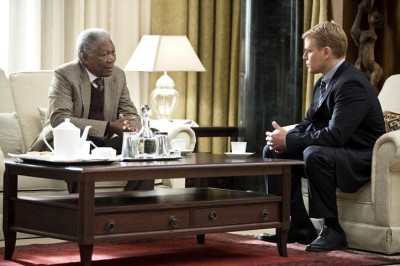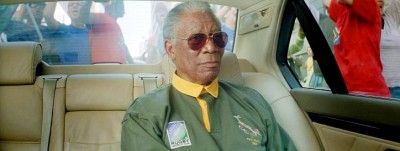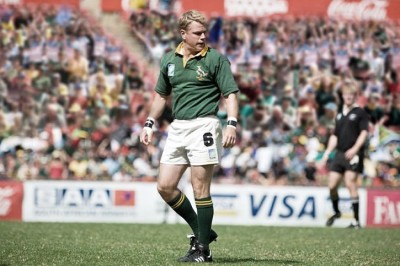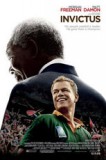| Reviews & Columns |
|
Reviews DVD TV on DVD Blu-ray 4K UHD International DVDs In Theaters Reviews by Studio Video Games Features Collector Series DVDs Easter Egg Database Interviews DVD Talk Radio Feature Articles Columns Anime Talk DVD Savant Horror DVDs The M.O.D. Squad Art House HD Talk Silent DVD
|
DVD Talk Forum |
|
|
| Resources |
|
DVD Price Search Customer Service #'s RCE Info Links |
|
Columns
|
|
|
Invictus

"Invictus" doesn't pursue any overwhelming dramatic demands or blinding shots of glory as a sporting tale of rugby or as a political film of historical revolution; it's Clint Eastwood directing in a manner he's always managed quite wonderfully: understated and softly spoken, assembled with a sure hand, not a trembling one. A film based on the events of the 1995 World Cup championship run in South Africa, "Invictus" may not provide a challenging, electrifying night at the movies, but it's sturdily constructed from top to bottom, depicting a benevolent story of racial discord and nationwide unification in an agreeably comfy, Eastwoodian manner.
Assuming the presidency of South Africa after decades locked away in prison, Nelson Mandela (Morgan Freeman) is searching for some way to unite his divided nation, still reeling from the effects of apartheid. His curiosity is piqued by the performance of the national rugby squad, the Springboks, inviting its captain, Francois Pienaar (Matt Damon), to tea to discuss the team's chances at the 1995 World Cup tournament, to be held in the heart of South Africa. Pienaar accepts the challenge, attempting to motivate his team to greatness, yet finding more inspiration in Mandela's tireless efforts to reawaken South Africa as a driving force of cultural and financial progress. As the world awaits the rugby showdown, Mandela trusts the power of the sport will help to heal his beloved country.

Working from the book "Playing the Enemy" by John Carlin, "Invictus" ("unconquered" in Latin) carries itself as a traditional underdog sports story, but the material sniffs around for much more than clear-cut rugby heroics. A snapshot of Mandela as he settles into his powers as the leader of a volatile country that once imprisoned him, "Invictus" observes the tentative first steps of this iconic man, slipping into his official routine, while facing a populace that's unsure what the integrated future will bring. Eastwood patiently brings Mandela into the light, following his subordinates and their worry, his security team and their anxiety (with both presidential protection and the mingling of white and black officers), and Mandela's own stoic optimism for his land, newly freed from bondage.
Eastwood's minimalist style works acceptably for "Invictus," shying away from sensationalizing Mandela's cultural wake to focus on his booming political conviction, sold through a series of inspirational speeches (courtesy of screenwriter Anthony Peckham), poetry inclinations, and exaggerated public poise. While monotone and prepared, Mandela is a difficult man to mimic, leaving Freeman's performance remarkable in the manner it commands the frame, while still permitting a vulnerability to appear in brief flashes of doubt. Freeman is sensational under Eastwood's watch, stern yet aware, coaxing in the president's fears and faults beneath an imposing public presence.

Pienaar is the more straightforward man of action, though Damon compensates for the lack of animation by working the character's inner sense of responsibility and awe of Mandela, developed through personal interaction and a field trip to Robben Island Prison to witness first-hand the president's suffocating living conditions. Pienaar is not a growly, commanding leader, and "Invictus" permits screentime to explore his failures and concern about the weight of responsibility placed on his shoulders. Pienaar's arc is one of osmosis, gradually inspired by the waves of change transforming South Africa, carefully becoming the face of its rugby salvation. Damon stands still for most of his screentime, and the character never grows into a war cry of leadership. Nevertheless, Pienaar's enlightenment is gracefully communicated.
The rugby sequences are...well, rugby sequences. Not familiar with the sport, it's interesting to see Eastwood avoid underlining the rules and regulations for audiences, trusting that somewhere along the way this rough game of bloodied men and their beloved ball will make a modicum of sense. The game footage is well shot and intermittently exciting, only succumbing to true cliché in the final moments, where Eastwood breaks out his slow-motion cameras to capture the aching closing moments of possibility.
"Invictus" is something to be respected; it's an old fashioned tale of hope from a director whose ease with simplicity, for better or worse, has always been something to cheer on. I can't imagine "Invictus" will inspire a stand-up-and-shout response from audiences, but its faint glow of optimism is nothing to sneeze at.
|
| Popular Reviews |
| Sponsored Links |
|
|
| Sponsored Links |
|
|
| Release List | Reviews | Shop | Newsletter | Forum | DVD Giveaways | Blu-Ray | Advertise |
|
Copyright 2024 DVDTalk.com All Rights Reserved. Legal Info, Privacy Policy, Terms of Use,
Manage Preferences,
Your Privacy Choices | |||||||










